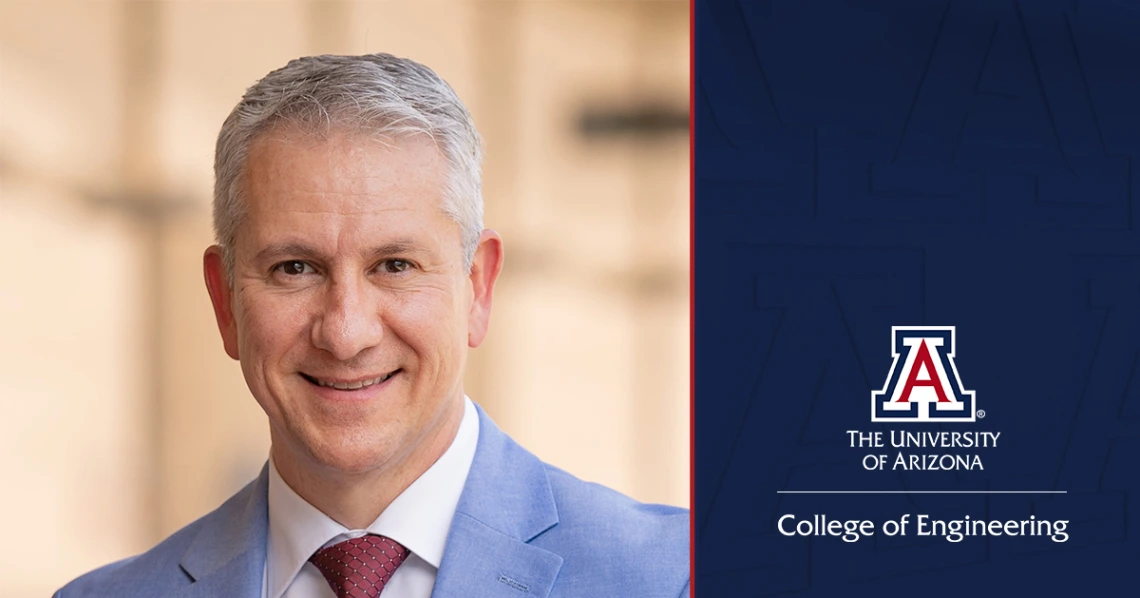Fall Semester Brings New Biomedical Engineering Head
Mario Romero-Ortega’s growth vision encompasses accelerating engineering in medicine innovation and empowering student startups.

No description provided
Mario Romero-Ortega was selected through a nationwide search to head the Department of Biomedical Engineering, beginning with the fall 2023 semester.
“I was drawn by the culture of collaboration, the quality of the students and faculty, and by the unified vision from University of Arizona leadership to impact biomedical engineering and health, from local to global,” he said.
Romero-Ortega will join the College of Engineering from the University of Houston, where he serves in the College of Engineering as a Cullen Endowed Professor of Biomedical Engineering and directs the undergraduate BME program. He is also a professor of biomedical sciences at the Tilman Fertitta J. Family College of Medicine.
“I’m confident Mario will bring strong leadership to BME at an exciting time for the department, including as we seek to expand our collaborations with UA Health Sciences,” said David W. Hahn, the Craig M. Berge Dean of the college. “He will be an asset to a team that is dedicated to improving health, advancing technology, and making the program the best it can be for our students and industry partners.”
First Steps
Romero-Ortega’s top priority is growing the department in a way that places its programs among the world’s topmost for BME. In addition to rankings, success indicators will include the publishing of innovative research, new partnerships with health industry stakeholders, and high levels of student engagement.
“To me, student success includes getting them excited to create solutions beyond the classroom,” he said. “I want to empower students to be the next generation of academic entrepreneurs that will lead the expansion of the health engineering industry in Arizona and the nation.”
Romero-Ortega is particularly excited to lead the department’s upcoming expansion of its bachelor's degree to the Phoenix Bioscience Core and BME’s part in the UA Cancer Engineering Initiative, which is uniting engineers and cancer researchers, among others, in a state-funded effort to improve prevention, diagnosis and treatment of the disease.
A Long-Term Role
Cancer engineering is just one example of why this is “a fascinating time for anybody involved in health care and engineering,” said Romero-Ortega.
“It’s undeniable: Medicine has been transformed by engineering, so much so that advanced medical
programs train doctors in engineering for a complete convergence – not only in the development of tools, but also in their understanding and application,” he said.
As Romero-Ortega considers the future of health care, he sees biomedical engineers working with diverse health professionals and across all engineering disciplines, to provide real-time clinical information and transform care options for patients.
Working together and incorporating tools including artificial intelligence, he says, the biomedical engineering community will create effective electronic devices that continuously collect and transmit diagnostic information. Users will be empowered to detect health conditions early or prevent them altogether.
“I think that shift is where biomedical engineering, and the College of Engineering in particular, will play a critical and empowering role,” he said.
Continuing A Rewarding Path
Romero-Ortega began his career as a neuroscience researcher, and one phone call brought him into biomedical engineering. When a colleague asked him to work on a project that sounded to Romero-Ortega like science fiction, he was fascinated and said yes.
He helped develop an electronic implant designed to allow amputees to move and perceive sensations from bionic arms.
Many years later, Romero-Ortega’s biomedical engineering research focusing on peripheral nerve gap repair, regenerative peripheral neural interfaces for robotic prosthetic limbs, and bioelectronics medicine applications has been presented in more than 192 publications. Winner of the Engineering Excellence in Research Award and the Tech Titans Award in Technology Innovation, he has been awarded seven patents, with additional pending. He is also the cofounder and chief scientific officer of RBI Medical Inc. and Pioneer Neurotech Inc.
Now, heading Arizona’s BME department is “the right combination of an incredible and rewarding opportunity and a challenge.” He and his wife, Martha, look forward to enjoying Arizona’s local cuisine and hiking trails and mountains. The couple have two adult children.

